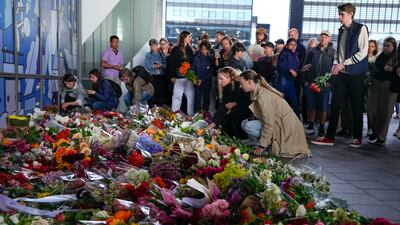More than 400 terrorists were convicted in Europe last year, as Europe's crime agency reveals 15 attacks were planned or took place, including a bomb attack.
In its latest terrorism report, Europol said 432 people were convicted of terrorism offences and a further 388 were arrested on suspicion of terrorism-related offences in 2021.
Two thirds of those arrested were linked to investigations into Islamist terrorism offences in Austria, France and Spain.
Three of four completed terrorist attacks last year were by Islamist militants, with one by a left-wing group, and they included stabbings, arson and using a vehicle to ram into a crowd.
Europol’s Executive Director Catherine De Bolle said terrorism was still a key threat to security in the EU.
“The findings of the report confirm that terrorism still poses a real and present danger to the EU,” she said.
“While our joint work to disrupt and prevent attacks seems to be having a positive effect, lone actors associated with jihadist and right-wing violent extremism are still a concern for EU Member States and Europol.
“In a time of geopolitical shifts, the EU needs to continue more than ever its counter-terrorist measures. Europol will continue to work closely with its partners to meet the challenges ahead.”
In one of the completed attacks, a Tunisian citizen stabbed and killed an administrative officer with a knife in a police station in Rambouillet, France, in April of last year.
In Spain, a Moroccan man rammed a vehicle into the terrace of a restaurant, mainly frequented by foreign tourists, last September. One person was killed and five others were injured.
The third attack occurred last November on a train from Passau to Nuremberg in Germany, when a Syrian man stabbed five people.
All three male attackers were not native to the countries where the attacks took place, while being legal residents of those countries.
The attack committed by a left-wing group saw it set fire to a number of energy cables which supplied the construction site of a new US electric vehicle factory near Berlin, causing €200,000 ($200,958) of damage.
The group, called Vulkangruppe (Volcano group), claimed it committed the attack because the US EV company was “neither green, ecological nor social”.
France experienced the highest number of attacks — five — followed by Germany with three and Sweden with two.
Austria, Denmark, Hungary, Belgium and Spain reported one attack each.

Suspects in failed and foiled attacks planned to use knives, explosives and vehicles.
In February last year, authorities in Denmark and Germany detained 14 people suspected of planning an ISIS bomb attack in Europe and seized chemical substances.
An investigation into a foiled right-wing attack in November 2021 led to Swedish police arresting a man who was allegedly planning to build a bomb using stolen fertiliser, and in France police arrested an extremist suspected of trying to make radioactive pipe bombs at a school.
In 2021, targets of bomb attacks included political parties’ headquarters, police vehicles, financial institutions, railway infrastructure and telecommunication towers, as well as vaccination and health centres.
The report raised concerns over the financing of terrorism.
“The increased availability of crowdfunding websites, providing opportunities to reach a large number of donors and quickly raise considerable amounts of money, makes this otherwise legitimate way of fundraising attractive to terrorist and extremist organisations,” it said.
“Spain reported that most of the funds channelled from the country to Islamist groups was raised through online crowdfunding campaigns.”
It also highlighted that migrant smugglers operating in the EU were in several cases suspects in terrorism investigations or had connections with terrorists and violent extremists.
Similarly, members of drug trafficking networks in the EU were found to be affiliated with right-wing or Islamist extremism.


